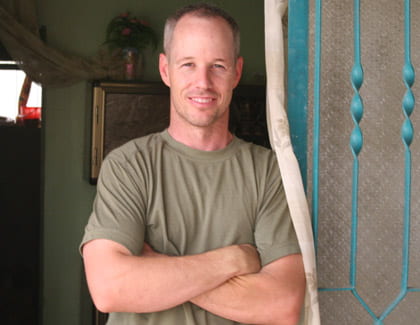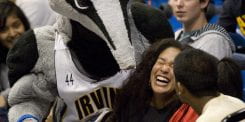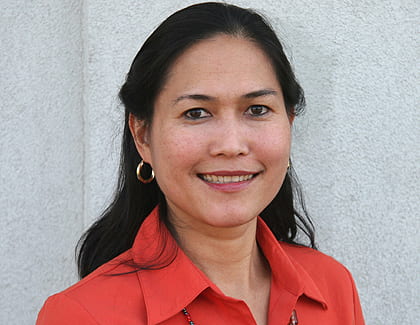Tales from the front
David Morris of the M.F.A. fiction writing program offers firsthand look at the Iraq War

In 2004, as an embedded reporter in Iraq, David Morris was riding along with a military convoy when a roadside bomb blew up half of the soldiers’ Humvee. For Morris, this was a near-death experience at the hands of an improvised explosive device. For the Marines, it wasn’t a big deal – “It was just a baby IED.”
Morris graduates this summer from UC Irvine’s M.F.A. fiction writing program in the School of Humanities. He has spent three of the last four summers in Iraq, and is writing his thesis about the war from a perspective rarely seen in the press. The thesis’s title: “My Baby.”
“If you go in not knowing what the story is, then you’re going to find the real story. You have to go over there and have the story find you,” Morris says. “I went to Iraq to write a deeper story about what’s going on over there. So I would just hang out, go on patrols and try to write down what the soldiers said, trying to capture all the details. Trying to make it a story instead of making it into a headline.”
In a piece published in the Virginia Quarterly Review, Morris writes, “To hear the Marines describe it, Ramadi is the Chernobyl of the insurgency.… A place devoid of mercy, a place where any talk of winning hearts and minds would be met with a laugh, both sides seeming to have decided, ‘This is where the killing will never stop, so give it your best shot.’”
Morris has worked as a rock-climbing guide, bike messenger, and in a television factory making cathode ray tubes. In the mid 1990s, he served four years in the Marines. The war in Iraq lured him back to the military in a new role as a journalist.
“I couldn’t escape the story,” he says. “Apart from all the politics, among all the other things war is, it’s a very life-changing experience for a lot of young men. It is in a strange way, beautiful. It’s difficult to say, but there’s something strangely aesthetic about what’s going on over there.”
Like many others who have completed the M.F.A. fiction writing program, Morris has received praise for his writing. The first of his three pieces for the Virginia Quarterly Review, “The Big Suck,” made it into The Best American Nonrequired Reading 2007. Peter Carlson, writing for The Washington Post, said “Morris has a great ear for the way American fighting men talk – the obscene, comic, macho poetry that he calls ‘grunt wisdom’ and ‘timeless dogface banter.’ I wish I could quote more of it, but it’s not quite the same with the expletives deleted. Morris’s prose reminds me of Dispatches, Michael Herr’s book on Vietnam, and that’s about the highest praise anybody can give to a piece of war reporting.”
Last December, Morris received a fellowship in creative nonfiction from the National Endowment for the Arts. After he graduates, he hopes to synthesize all his work into a book that moves beyond talk of Iraq from a pro/con perspective.
“People talk about Iraq, but they’re not talking about Iraq. They’re talking about how to use it as a political weapon. No one is really pushing past the issue of whether we should stay or go,” Morris says. “Next to no one is talking about what the Iraqis want. Next to no one is trying to understand what’s really going on.”
Morris, for one, is trying to change all that – through the force of his words.

